Land of bridges and tunnels
Guizhou is a relatively poor province in southwestern China, with lots of long tunnels and high bridges. And when I say “southwestern China”, I actually mean southeastern China, just as “midwestern” states like Ohio are actually eastern states. Last week I traveled to Guizhou, and this overly long blog post will offer some random observations on everything from economics to travel tips.
1. The World in a Day
For most of human history, it was impossible to grasp the range of the habitable world in a single day. Beginning in the mid-20th century, one could fly from a cool region to a hot region in one day. But that was an artificial experience—you missed everything in between. That all changed in 2012, when China built a high speed rail line from the north to the south of the country. Now you could board a train at 9am in cold, snowy Beijing, and get off 8 hours later in tropical Guangzhou, at the same latitude as Havana.
A few years later the line was extended further south to Hong Kong, where you arrive an hour later. For the first time ever, humans can see the gradual change in landscape from the temperate zone to the tropics, all in a single day.
2. From India to Iowa
Twenty five years ago, my wife and I took a sleeping car train from Beijing to Wuhan, about half way down to the south. The train was pretty primitive, both slow and filthy. I was curious to see how things had changed since our honeymoon.
The first part of the trip is the highly populated North China Plain, a roughly triangular flat region with Beijing at the apex. My initial impression is that the Chinese countryside has changed almost as much as the cities. In 1994, I was struck by the number of peasants I saw working out in their small fields or walking along roads. It looked very different from where I grew up in the American Midwest, where the huge fields look empty as you drive by. On this trip, I didn’t see a single person out in the fields for at least the first 300 miles. In fairness, it was a hot September day, and perhaps there was no reason to be outside. Nonetheless, the Chinese now seem to spend more time indoors, and they are also more obese (albeit less so than Americans.)
There were other changes as well. There were now lots of very large cornfields, much like where I grew up:
Presumably this corn is harvested by machines. I seem to recall more wheat in 1994; perhaps the corn reflects the greatly increased consumption of meat in China. In any case, it was as if the North Chinese Plain had transitioned from India to Iowa in 25 years. Except that the Chinese farmers are still much poorer than those in Iowa.
The houses in rural villages looked bigger and more modern (albeit unattractive), whereas back in 1994 the rural villages contained small, crumbling, dirty grey brick dwellings. And there was vastly more evidence of rural factories, superhighways, warehouses, etc. Most notably, the cities we passed through in Hebei and then Henan province were now full of those boring 30 story apartment buildings that are ubiquitous in urban China. Unlike in America, even “small” Chinese cities (say 100,000 to 2,000,000 people) are now completely dominated by tall apartment buildings:
BTW, the Chinese view Henan people as somewhat untrustworthy (which is really saying something.) Hence, they are discriminated against, even though they are Han Chinese.
The North China Plain is also highly polluted; indeed Beijing may be the only large city in the world where air pollution gets worse as you go out of the city into the countryside. One problem is coal burning, which is concentrated in Hebei, Henan, and Shandong:
As the train traveled further south, the landscape gradually became hillier, greener and wetter. At Wuhan (in Hubei province) we crossed the wide Yangtze river, and soon after we were in Hunan province. (English translations for provinces, starting in Beijing: North Capital, River North, River South, Lake North, Lake South.) The houses in Hunan looked surprisingly nice, but that’s probably due to their proximity to the rail line—Hunan is relatively poor:
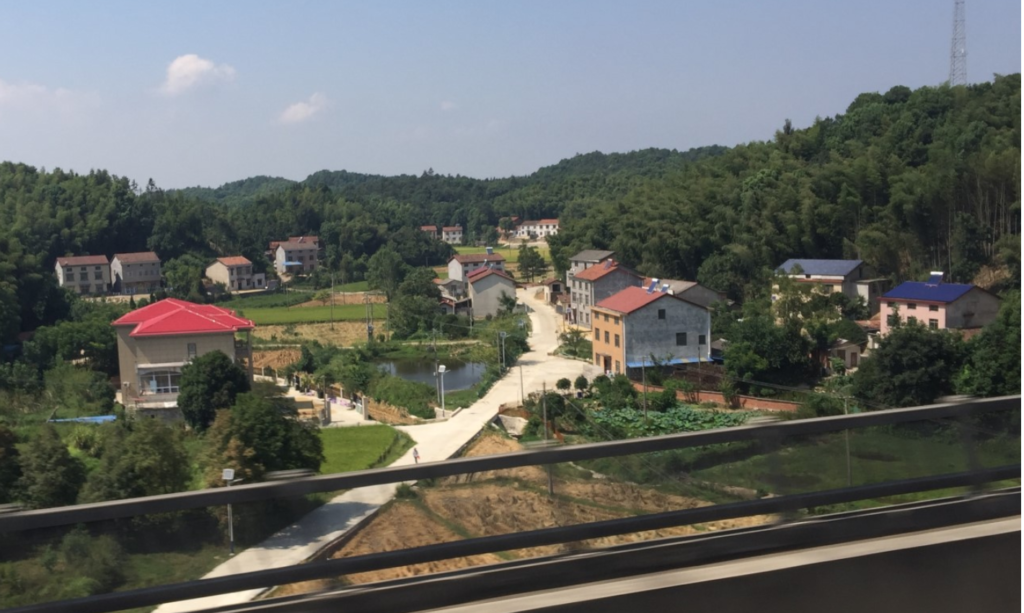
3. Bridges and Tunnels
At Changsha we took a right turn to the southwest, and left the Beijing-Guangzhou line. Beginning in western Hunan and throughout Guizhou it seemed like almost non-stop tunnels and bridges—mostly tunnels. I thought about the engineering decision as to whether to use more tunnels or more bridges, and concluded that tunnels must be cheaper per unit of distance. By lowering the rail line there are more miles of tunnels and fewer miles of bridges. Very little of the line is on flat ground.
Despite the attempt to rely more on tunnels than bridges, Guizhou ended up with 40 of the world’s 100 tallest bridges, including the very tallest. Read that again. I didn’t say China had 40% of the world’s tallest (which would be a major achievement), I said a poor, small province in the interior with only 2.5% of China’s population has 40 of the world’s 100 tallest bridges.
Guizhou doesn’t have the world’s longest tunnels due to the fact that its landscape is very “choppy”, with endless lumpy “karst” mountains made out of limestone. But there are many, many 1 to 5-kilometer tunnels. Often you enter a new long tunnel just 100 meters after exiting the previous tunnel. While building one new tunnel they recently encountered a huge cavern, and had to build a span 93 meters long across a cave in the middle of a mountain.
While the Chinese high speed rail (HSR) system is justly famous, the new expressway system is also quite impressive, roughly twice the length (so far) of America’s much more famous system. And it was built in far more difficult terrain, with the same reliance on bridges and tunnels as the HSR system. They are toll roads, which may help explain why it is currently underutilized. It remains to be seen whether China will grow into its expressway system as they’ve done with the now crowded HSR lines. As of today, it’s just more Chinese “malinvestment”, at least in Guizhou.
After nearly a month in China, I am more convinced than ever that their government should focus on building infrastructure and nothing else, other than taking their boot off the Chinese people. Especially the Uyghur people.
4. Chesterton’s Chinese Fence
As in India, the south is nicer than the north. After 8 1/2 hours we arrived in Guizhou’s capital (Guiyang), which was actually cooler than Beijing (due to the altitude), and much less dusty. Nonetheless, Guizhou is warm enough to have lots of banana trees. We stayed one night in an inexpensive 5-star hotel in Guiyang, right next to a Rolls Royce dealership. As we walked out to look for a restaurant, very attractive young ladies were approaching the hotel to provide entertainment for wealthy Chinese travelers. Extreme inequality favors rich men. A few blocks later we were led (misled) by GPS into dark dirty alleyways with snarling dogs roaming around.
Guiyang is much poorer than Beijing, but also far more developed than Kunming was when I visited in 1996. (Kunming is a similar size city in next door Yunnan.) Because Guiyang is poorer than Beijing, it has more of the Chinese “craziness” I recall from earlier visits. Often, it’s just minor things. The restaurant charged us money for a tiny set of paper napkins, and the waitress had a clear plastic mouthguard to shield diners from “germs”. The table was inside a giant birdcage. The taxi driver had a tv mounted on the dash, and watched soaps as he drove us around. (BTW, the taxis in China often lack seat belts.)
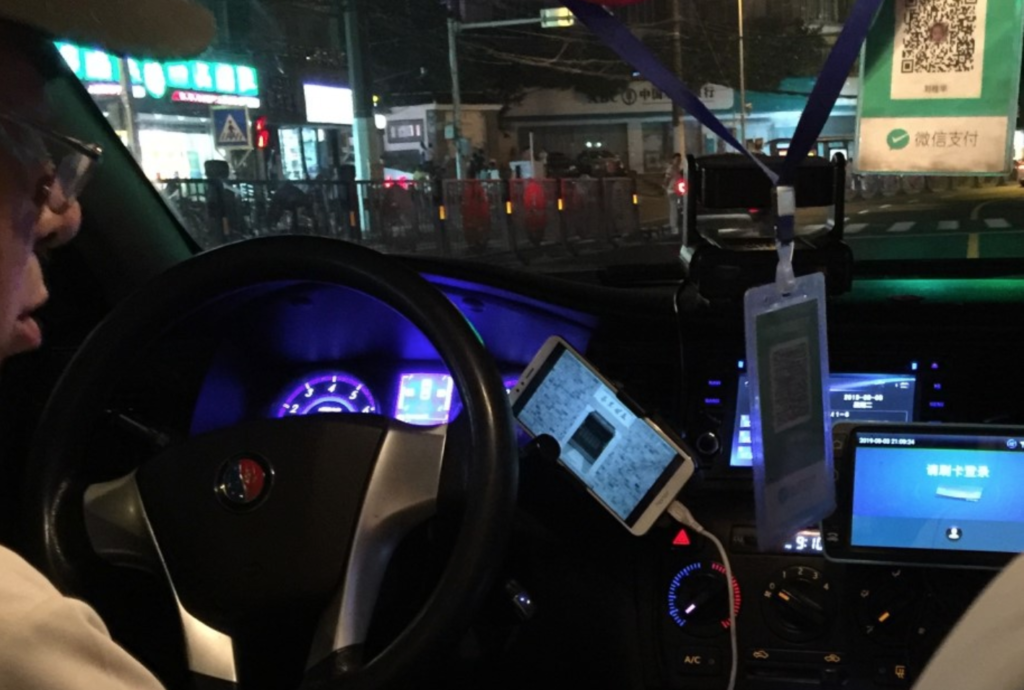
China is full of puzzling things that seem somehow “wrong”. There are annoying fences and walls everywhere, symbolic of how the authorities like to keep everything very regimented. Some of the annoyances may have a justification—perhaps they need fences along roads to keep pedestrians from spilling out into traffic. But do they really need TSA style security for people entering a small tourist bus? Is this a likely target of terrorists?
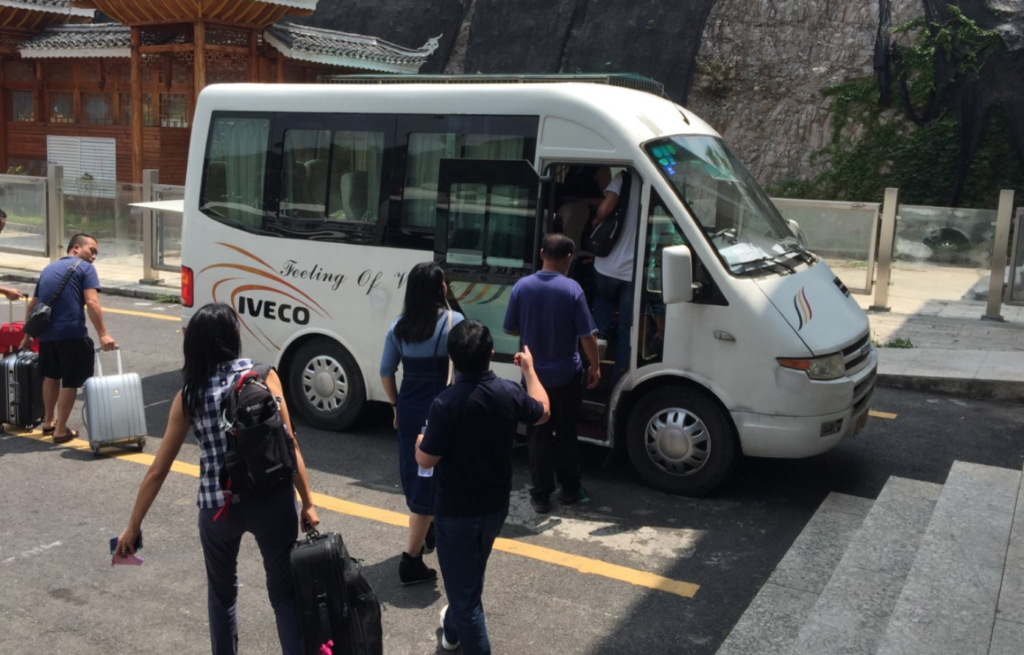
While some of the craziness in China may be justified on Chestertonian grounds, surely not all of it can be explained away. (Although if he were alive, Chesterton would view modern China as an almost perfect dystopia. Imagine Chesterton visiting a Foxconn factory.)
5. China’s Ethnic Minorities
We stayed in Guiyang just one night, and then spent the next seven nights in five different locations—not a good idea. We took the HSR to the mid-size industrial town of Kaili, recently made famous by the world’s hottest new director. From there we caught a series of buses to a village inhabited by the Miao ethnic group, which is related to the Hmong tribes of southeast Asia.
Guizhou is 37% minority (vs. 9% for China as a whole), part of the large collection of minorities in southwestern China. These groups are not as famous as the Tibetans, Uyghurs and Mongolians, but are far more numerous. They were forced into less productive mountain areas during the Han demographic expansion, and remain much poorer and less well educated than the Han Chinese. To westerners they look East Asian, however, so it’s not really a racial difference.
The quaint Miao villages and colorful costumes are a big draw for Han Chinese tourists. In China there is no PC squeamishness about viewing minorities in colorful costumes as charming and primitive.
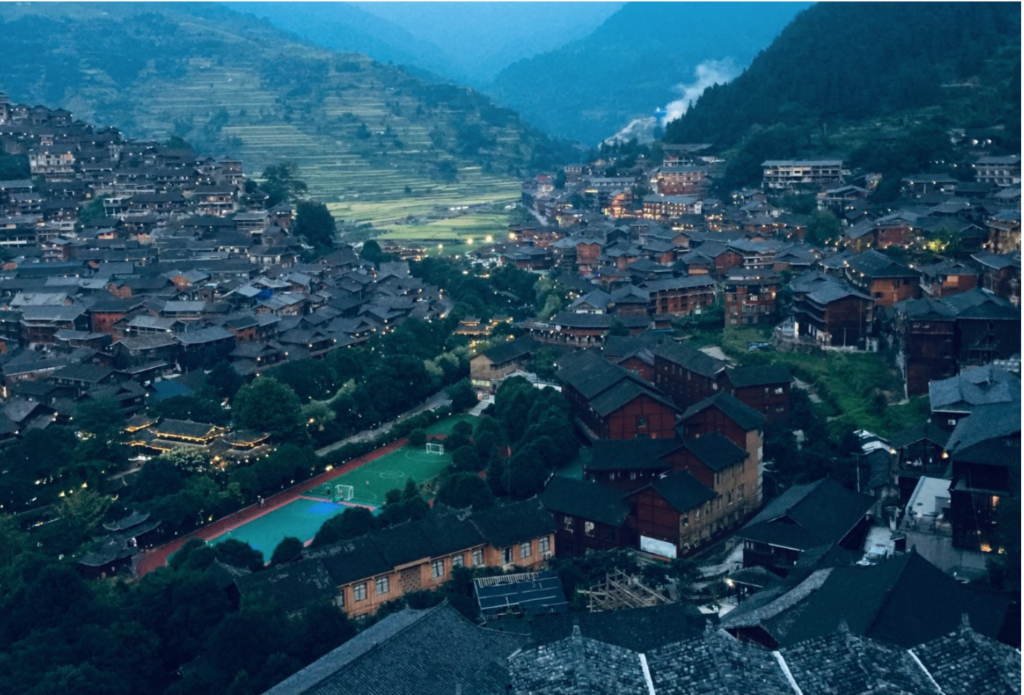
I saw a couple of westerners in the Miao village, but absolutely no more over the subsequent 6 days as I traveled through Chinese national parks thronged with tens of thousands of tourists, all Chinese (or at least East Asian.) The fact that there were no westerners in any of the next 4 stops is an indication that you do not want to follow in my footsteps. Trust the market.
We took a grueling 9-hour bus trip (four buses) from the Miao village to a place with lovely rice terraces that isn’t in any guidebook, not even (I’m told) Lonely Planet. Travel in rural China is really, really hard, even if you know the language. If not, forget it. Without my wife I never would have been able to visit some of these spots. China does not offer adequate maps (paper or internet). We only made it to the next stop before dark because one bus driver flagged down our next bus, which had already left and was going in the other direction, and we shifted our luggage from one to the other.
The rice terraces we saw (one of the three best examples in China), were located roughly halfway between Libo and Congjiang on this Google map, in a tiny unmarked village called Jiabangjiang—near the Guangxi border:
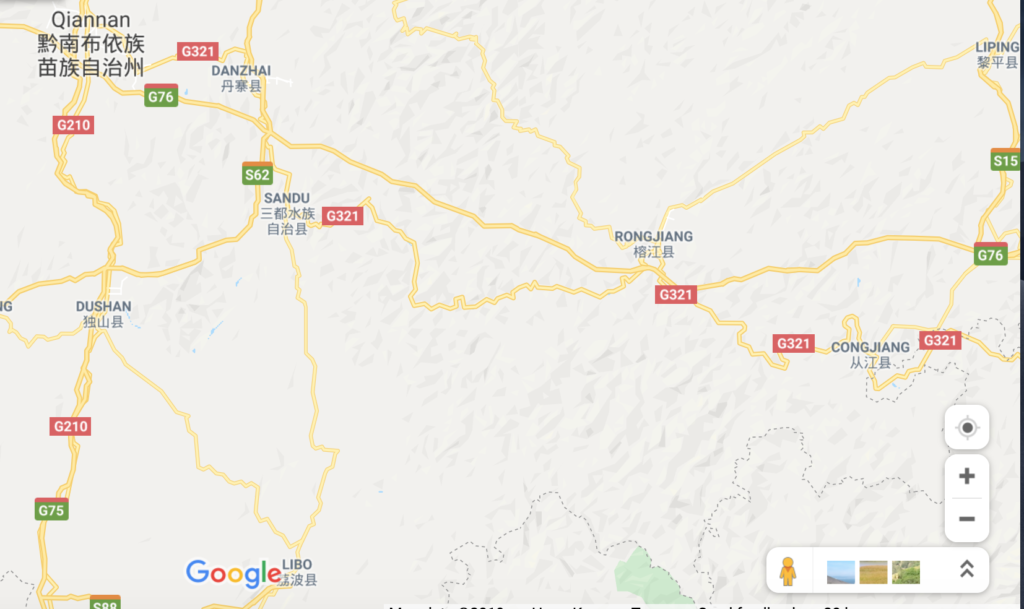
Jiabangjiang is the closest I’ve ever come to “middle of nowhere” in China. It’s surprisingly hard for tourists to ever seen the “real China”, as they usually see either cities or rural areas of tourist appeal. The non-tourist villages our bus went through are probably the closest I’ll ever get to the typical Chinese countryside of the interior provinces.
The rice terraces were indeed stunning, but because of our miscalculation on travel times we only had a few hours to observe them. I recall my wife paying 7 cents for a metal knife to cut some fruit she purchased—probably the last time in her life she ever pays less than 10 cents for a durable good. I recall being woken up at 7am by a massive fireworks demonstration in this tiny village of a few hundred people. WTF?!?!? It turns out that we happened to arrive right before the Miao New Year’s Day, which weirdly is in early September. When we went out for breakfast it was like walking through Syria or Iraq during their most intense fighting; there were explosions going on all over, as people threw long strings of powerful firecrackers into the streets. (Not the wimpy ones used in America.)
Now return to the map. It took us 9 hours to go the roughly 35 miles (as the crow flies) to our next stop in Libo. We began by going in the exact opposite direction—northwest past Congjiang to a HSR station. We and several other tourists missed the train by 5 minutes and had to wait 90 minutes because our driver decided to stop and get the van washed about 5 miles before the train station. WTF?!?!?
Then 40 minutes on high speed rail to Duyun. Don’t see it on the map? That’s because it’s called Qiannan on the map. That sort of thing is common on Chinese maps. Later I learned that a (shortcut) expressway from Rongjiang to Libo was completed in early 2019, but we had no knowledge of this at the time, as it’s still not on Google maps. Ask the locals? Are you joking? Libo might as well be on the other side of the moon. I doubt the locals even know there’s a trade war with the US going on. Then another few hours by bus from Duyun/Qiannan to Libo. The whole trip was probably over 200 miles, to go 35.
6. Tourism, Chinese Style
Spectacular Jiabangjiang had only a handful of tourists, but with Libo we began three major stops full of Chinese tourists. While the scenery is beautiful, it’s not quite in the class of the other Chinese parks cited in its promotional material, such as Guilin, Jiuzhiagou, and Zhangjiajie. See the originals instead. Instead, the greatest interest lay in observing the Chinese tourism industry in action.
Let’s begin with the positive. The Chinese have done a fantastic job improving their facilities. The toilets used to be awful, and now they are often first rate. These urinal dividers were works of art (and there are similar examples elsewhere):
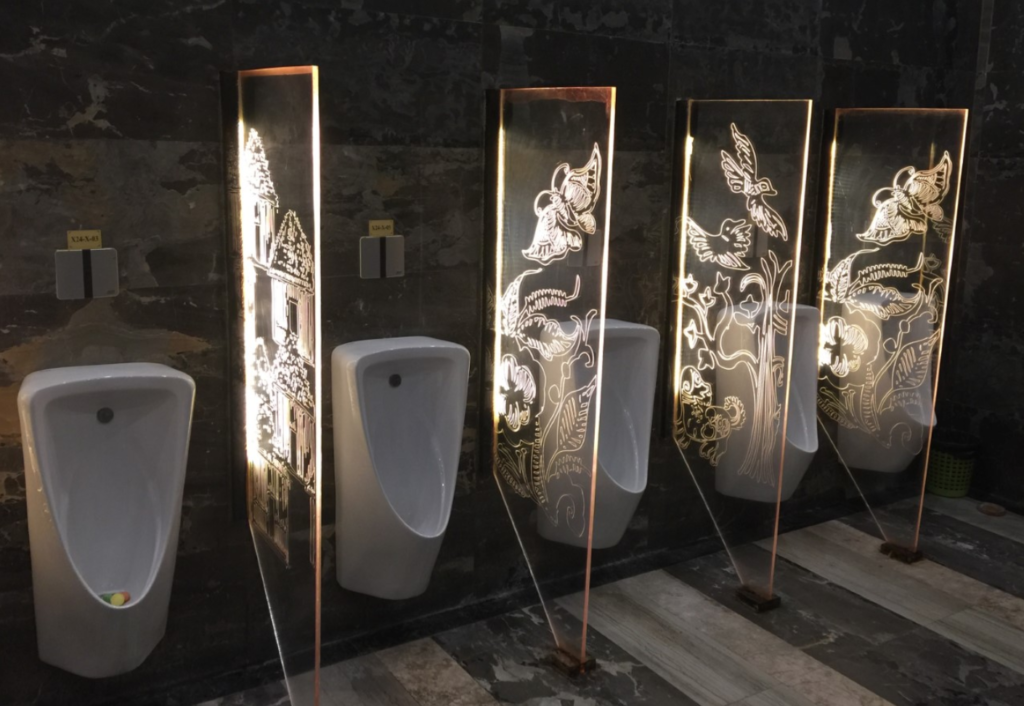
Outside the toilet was a big game trophy, fitting for a national park. And below the bull head are photos of a man and woman being honored for keeping the toilets spotless:
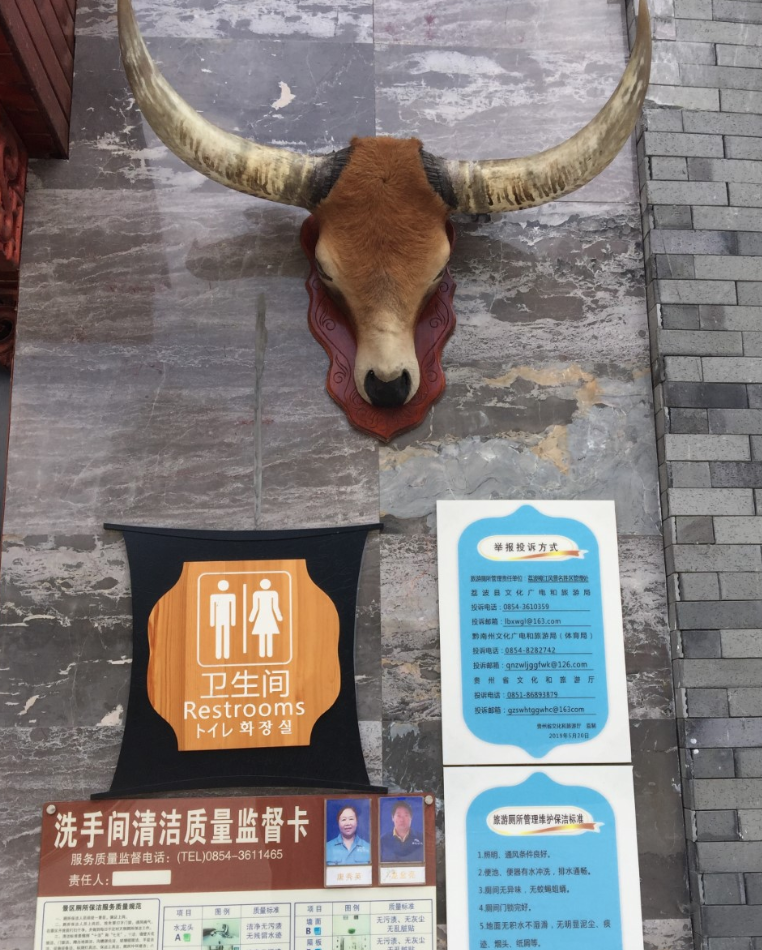
The Chinese don’t obsess about authenticity, rather they try to reshape the environment to make it more pleasing. They especially like waterfalls, and at one point we came across one that seemed almost shot out of a firehose:

It turns out it was too good to be true; a fake stone ledge was manufactured to create this effect:

I wonder what Capability Brown would think of the Chinese national parks.
The attire is equally interesting. The women tend to dress up for hiking, with lacy or chiffon-like pastel-colored dresses being especially popular. Spiked heels too. They also seem to wear too much clothing, at least from a western perspective. It was 93 (34C) and humid, and I saw one woman wearing long pants, two shirts and a hood. Only her ponytail poked through the hood. That was exceptional, but almost all wore a lot of clothing. (BTW, the Chinese also dress up more when hiking in America, though not to such an extreme. Fear of tanning?)
Fortunately for westerners, the Chinese tourists clump together. It can seem like Times Square in one area, and completely empty in another equally nice area that is not “recommended”. Sort of the way the Mona Lisa room is packed and equally nice rooms of art in the Louvre are not crowded.
Unfortunately for westerners, the ubiquitous fencing and regimentation are a problem everywhere in China. And the lack of maps. It’s hard to just wander off on your own, down some lonely trail. Fortunately, people over 60 get in free, and that includes affluent foreigners who don’t deserve this privilege. Foreigners are so rare in the places I visited that there was always a discussion of whether the over 60 rule applied to me, and on one occasion I lost. So at least once I contributed money to the Chinese government—otherwise I mostly aided the private sector. . . .
. . . Except for the hotel at the next stop, which included Huangguashu, Asia’s biggest waterfall. That hotel was located right in a national park, and my wife thinks it was government-owned. That make sense, as the service was far worse than the other 4 hotels, which were privately-owned. The front desk wouldn’t even help us get a taxi to the bus station—“take Didi”. China’s version of Uber is called “Didi” and is far worse than Uber. It wouldn’t survive if they allowed competition from Uber and Lyft. The Chinese government is doing a major disservice to Chinese consumers.
I should also mention the wash cloth scandal. When checking out a scowling lady held up an incriminating picture on an iPhone, showing a big smudge of dirt on a white wash cloth found by the maid. This held up getting our (cash) security deposit back, and an investigation was undertaken to determine if the wash cloth could be cleaned. I was to blame as I had used it to clean dirt off my shoe. But keep in mind this is probably a 25-cent item, and of course it can be cleaned. We were eventually found not guilty and got our security deposit back. This sort of stuff happens almost every day in the more “backward” parts of China. Seriously, consider Japan if you plan to visit East Asia.
In some ways, China is increasing difficult for foreign tourists. Because of Didi, the taxi system is all messed up, and now it’s often difficult to get a regular taxi. WeChat is great for the Chinese making purchases, and because it’s a debit transaction it’s perfect for solving the “trust” problem in China. But it’s bad for tourists who want to use credit cards. Even cash may not be accepted, due to a lack of exact change.
Because lots of Chinese can now afford to travel, western tourists have gone from being royalty in the 20th century to loser cheapskates not worth bothering with in the 21st century. Maybe this helps to explain the anti-Chinese prejudice that has recently developed among America’s elite. They resent losing that feeling of being on top when visiting China.
WeChat is so common that credit cards are virtually non-existent. We presented a credit card at a huge fancy restaurant near the waterfall (we were the only diners.) The very young waitress looked befuddled at first, and then waved it over the top of the card reader, as someone might put their iPhone over a QR code when using WeChat. My wife had to show her how to insert the credit card into the chip reader. It’s not unlikely that this restaurant in a luxury hotel costing $500/night had never seen a credit card. The high-quality meal was cheap, however:

The first food picture I recall ever taking.
7. Why is Chinese Service so Bad?
It’s not always bad. The owners of the little family run hotels do try. But they can’t resist cutting corners to save money. Many other people in the service sector don’t care at all. Park employees are not like the outdoor enthusiasts that work at Yellowstone. It’s just a job. If they see people smoking or throwing trash off the tour bus, they just don’t care. There are several possibilities for the bad service:
1. Culture
2. Poverty
3. Legacy of communism
It’s probably a bit of all three. It’s worth noting that service in China is getting less bad. But that means rising from 3 to 15 on a scale of 1 to 100. China’s also getting richer and less communist. Other Chinese areas like Taiwan, Hong Kong and Singapore have better service than the mainland; so it can’t just be Chinese culture. Of course, mainland China is poorer than those three areas, but that’s also partly a legacy of communism.
And like everything in China (construction quality, aesthetics, etc.) service is wildly uneven.
8. Deja vu all over again
One thing I really like about visiting China is that it reminds me of my youth, especially in the way that children roam free. My brother and I used to ride in an open trailer that my dad pulled behind his car, bumping over railroad tracks. I saw the same thing in rural China. Also, kids play with firecrackers, as we used to do. They ride motor scooters at roughly age 10. You see tiny three-year olds sitting behind their mom on a scooter going down the highway in the driving rain, holding on for dear life (no helmets). Six-year olds cross busy urban streets in the city, all by themselves. Imagine a country free of helicopter parents!
I also enjoy seeing people smoking in places where it was once allowed in the US. On one of our buses even the driver was smoking, despite this sign:
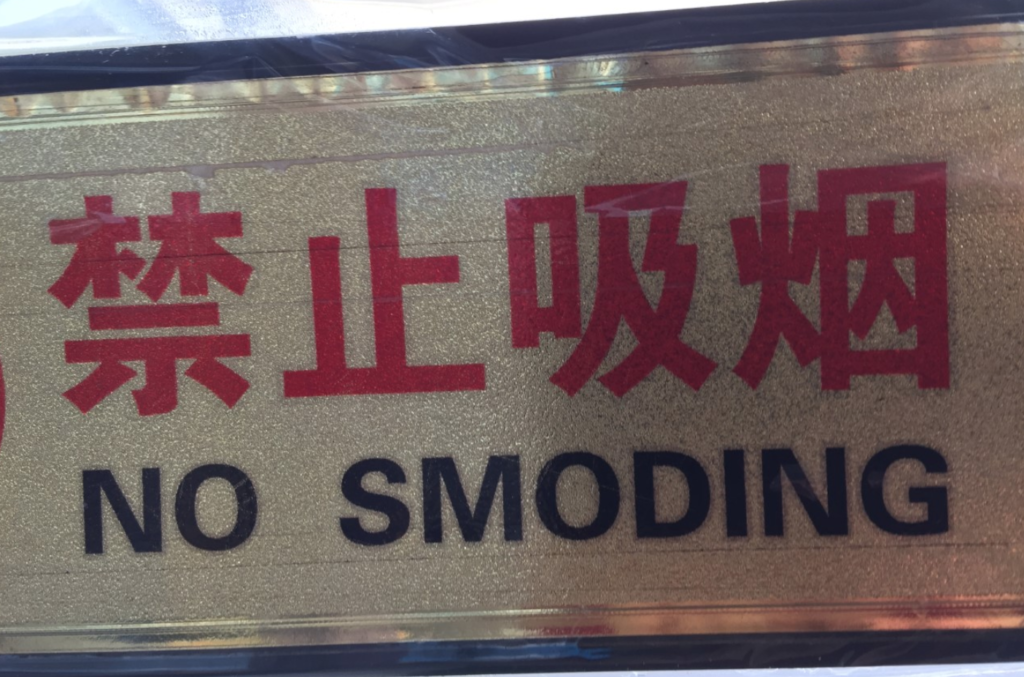
Chinglish can be charming. Highways signs warn “Don’t drive tiredly”. While consumer foods stress how they are “not unpleasant”;
Many things in China remind me of America circa 1960. People tend to dress up more. Their sitcoms look like the broad and simple (pre-irony) comedies of the “I Love Lucy” era. The music is often the schmaltzy stuff my parents enjoyed. Even on budget local airlines, the stewardesses look like models, and explain the safety devices with ultra-refined hand gestures.
A Beijing art gallery had an exhibit that consisted of old Kodachrome pictures of middle-class American life in 1959, such as housewives with aprons taking care of spotless children. The dealer told me these color pictures appeal to Chinese buyers, as this was a depressing, grey period in Chinese history.
BTW, the bus with the no smoding sign also had plenty of trash cans for people to throw stuff into, right in the aisles! Just step over them!
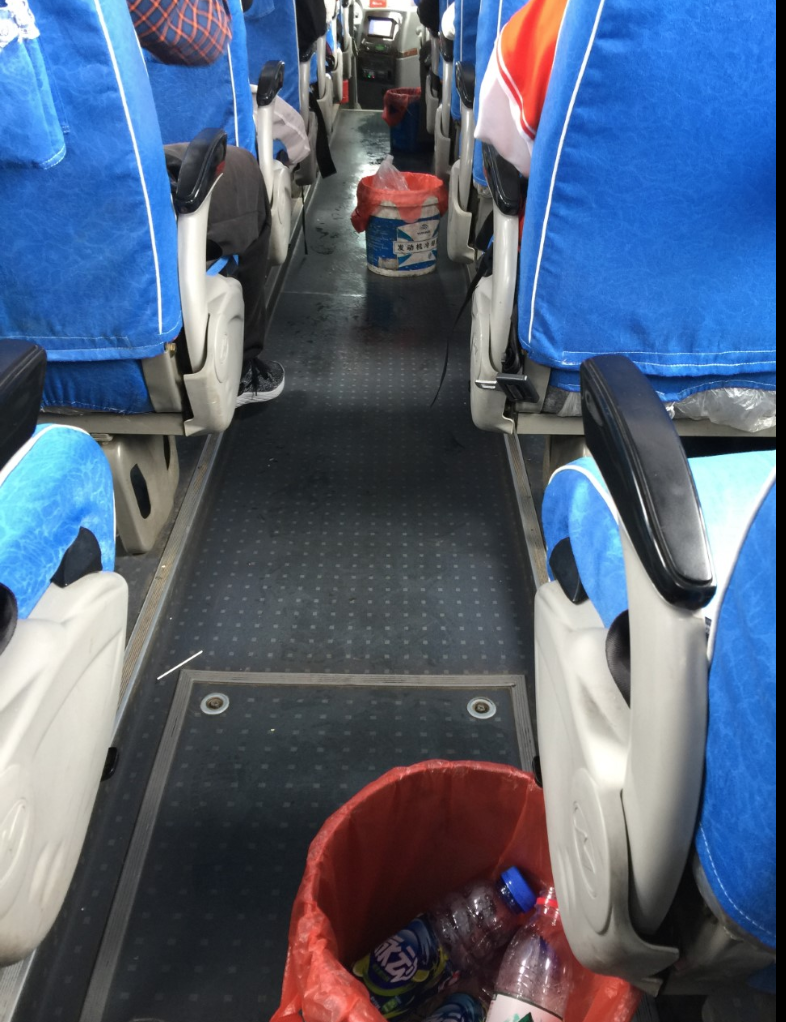
Intercity buses also lack toilets, even on 4- or 5- hour trips. Plan ahead. Buses frequently stop at gas stations to fill up. And there is endless security in the boarding process, one check after another. On one narrow mountain road (no guardrails) the bus got behind a series of trucks carrying oversize components for huge windmills, and engaged in a long frustrating process of trying to pass without going over the cliff.
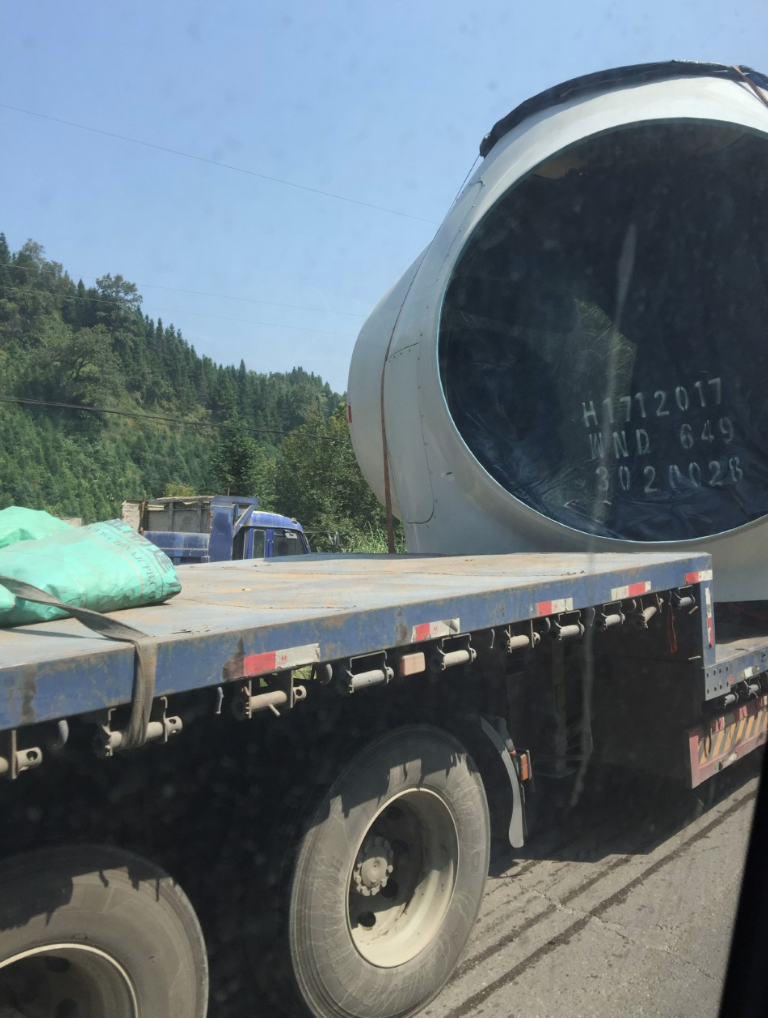
There are no sidewalks in rural areas, so men, women, and schoolchildren walk along the same dusty highways as these big buses and trucks.
9. Kaili Blues
It was the final stop that gave me the feeling of Bi Gan’s films. It rained for the final four days of our trip. Seeing the motor scooters wave through the wet dark night on narrow roads brought back memories of “Kaili Blues” and “Long Day’s Journey Into Night”. When we arrived at our last hotel south of Xingyi, the room had water coming through the roof. So did the next room they chose for us. The third room was mostly dry, and wasn’t bad if you don’t mind giant spiders and lots of mosquitoes. And no door knob. (You had to padlock the door on leaving the room.) We stayed two nights, and at both restaurants we went to for dinner they acted like we had woken them from a nap when we arrived. Everything is very informal in the countryside. And really cheap.
The owner of the second restaurant took my picture to use in future advertising. So did the owner of the hotel. Apparently if a westerner visited their establishment it had to have some merit.
The Chinese create endless miles of landscaping, with beautiful flowering hedges along tourist highways and thousands of orate lampposts. And it all leads to a stunningly beautiful lake, which is . . . full of floating water bottles. China constantly throws curveballs at you. One minute you think everything is garbage, and the next you see beauty that takes your breath away.
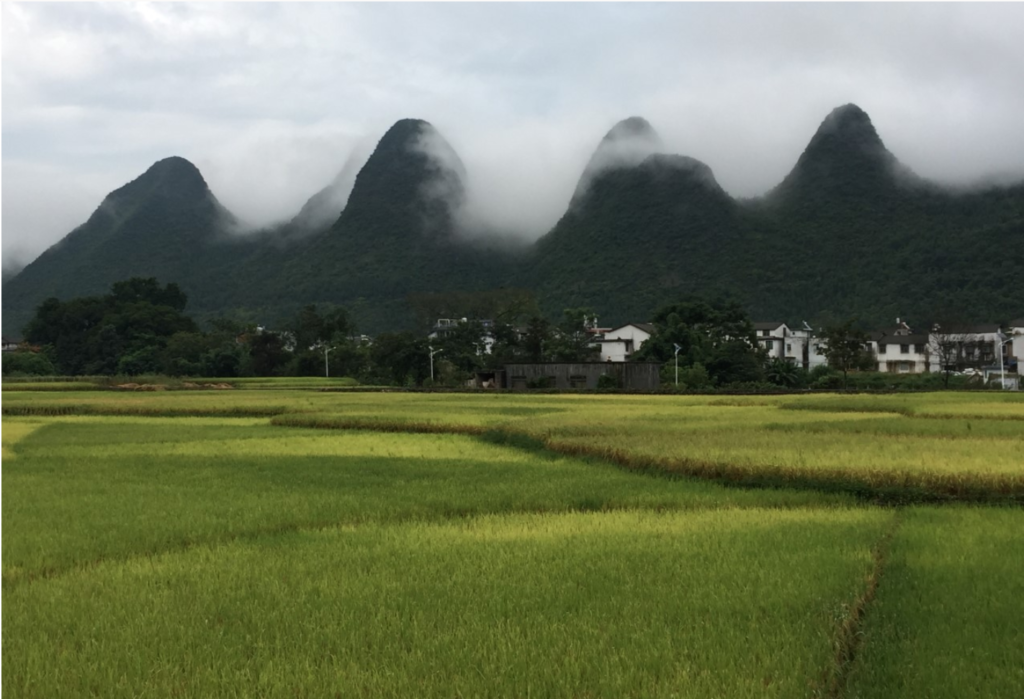
While driving to the airport for our flight back to Beijing, the sun finally came out and the air was incredibly clean after 4 days of rain (this shot was from the plaza of a conference center outside Xingyi, a center of gold mining):
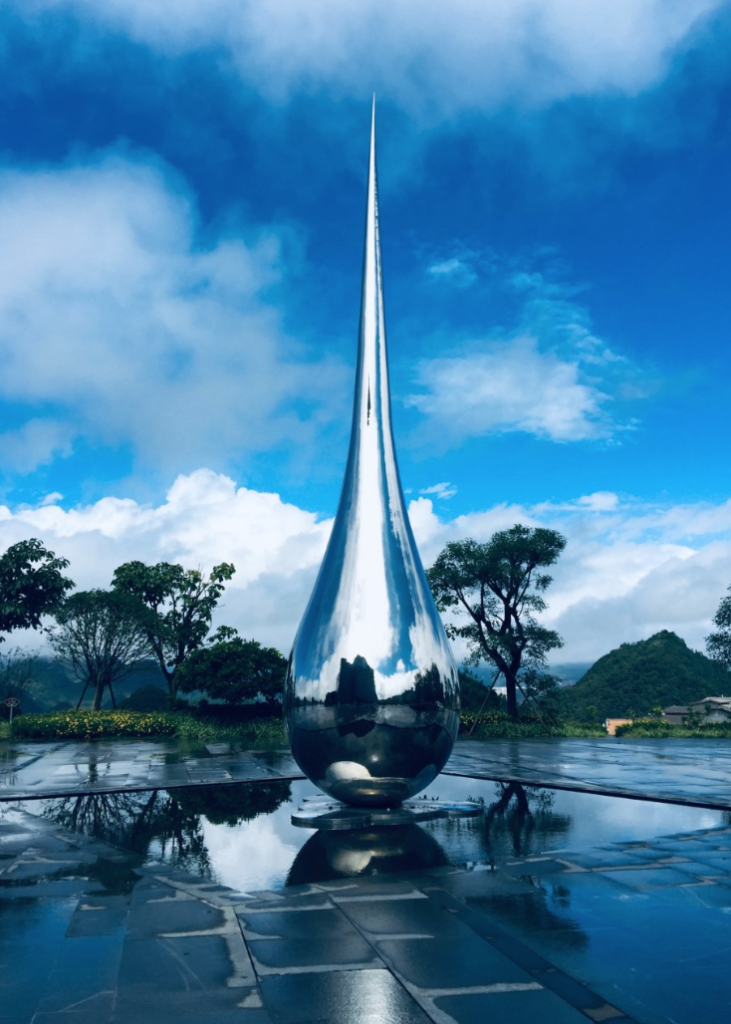
PS. Weird things happen all the time. I’d never once seen my name used in a commercial application, not in 63 years, until spotting this young woman sitting across from me in a Guizhou train station:
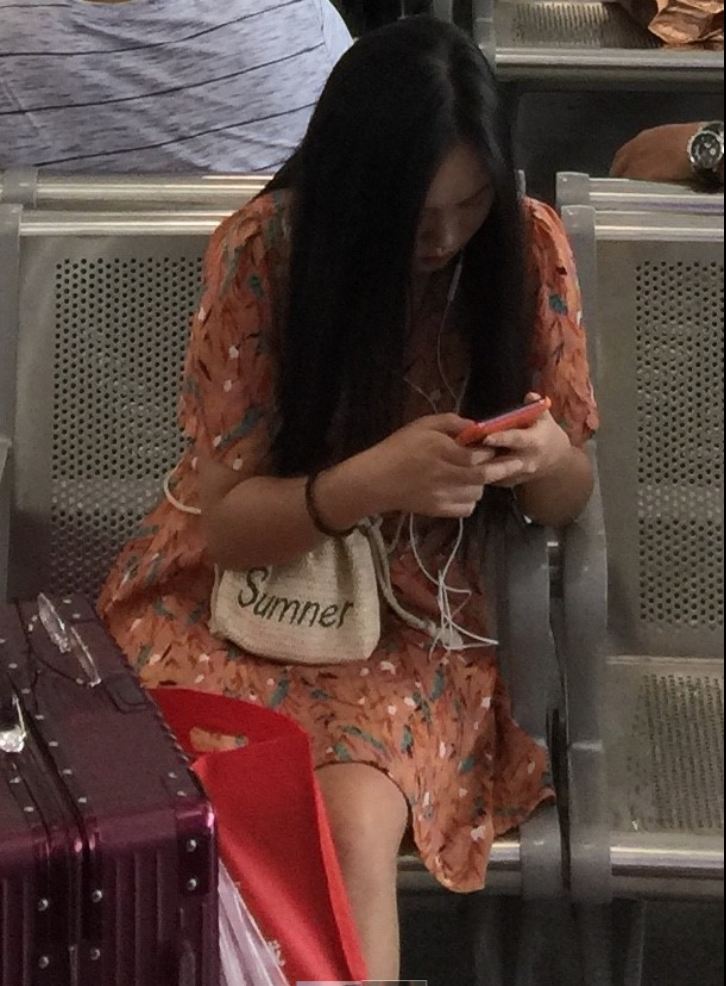
WTF? A sign? And how about this house in Libo:
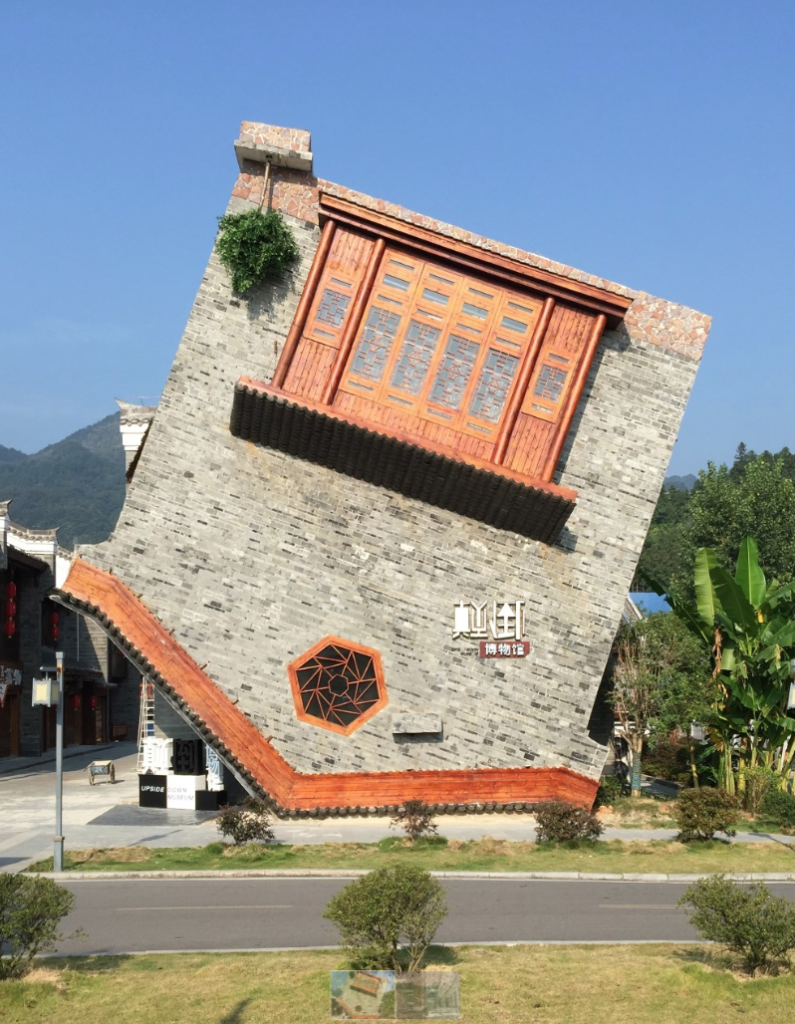
It’s an upside-down symbol of an upside-down country. The taxi driver didn’t want to use AC in 93-degree heat, and two days later the taxi blasted the AC when it was cool and rainy out.
Tags:


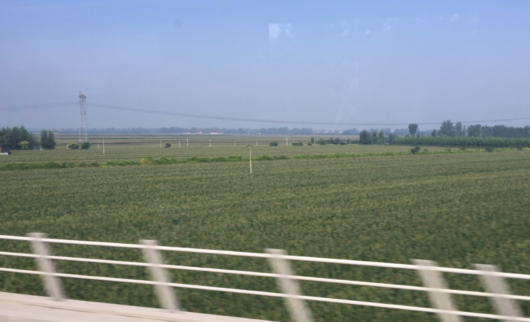
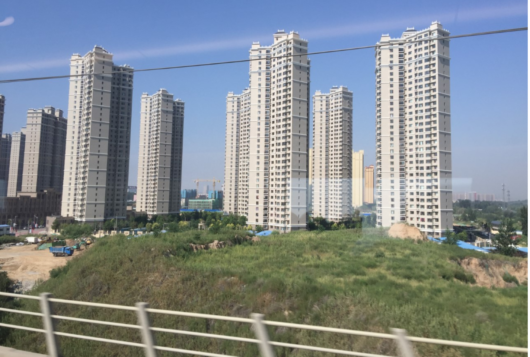
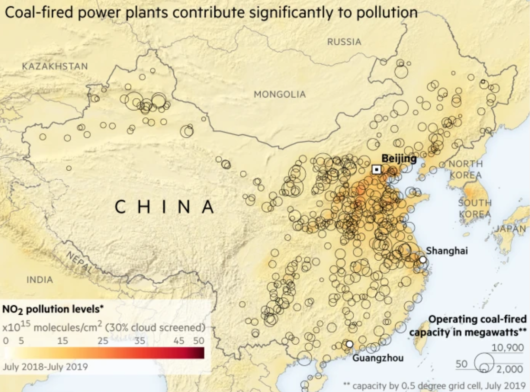
13. September 2019 at 21:54
[…] Here is more from the Scott Sumner travelogue from Guizhou. […]
13. September 2019 at 22:56
In Singapore they also often charge you for napkins in restaurants.
(But for comparison, in Germany they won’t serve you any tapwater ever, and charge you for water more than for beer.)
13. September 2019 at 23:35
Thanks for this Scott, very interesting. You are quite unusual for your age and social situation in being willing to take on these challenges, I applaud you for that.
I would guess that the poor service and cheapskateness comes mostly from communism and brutal fact that you never got to choose your supplier of services in that environment, like the whole country was one giant Dept of Motor Vehicles. The older generation in Eastern Europe are like that, but the younger generation get that people have a choice and if they want to survive then they have to be nice to their customers.
14. September 2019 at 00:12
As a westerner living long-term in China, I have a few differences of opinion with your observations.
1. I have found Didi to be perfectly on par with Uber – and I would love to know how it is profitable. For a 4km commute I pay only 8-10RMB, barely more than a dollar. This is in one of the most affluent cities in China. Subtracting the price of fuel and the worker’s wage, how is this possible?
2. I have not found the Western “royalty” effect to be wearing off at all. In Yangshuo, a very picturesque and touristed satellite town of Guilin, we were given preferential treatment and explicity seated in the front window seat so that the restaurant could show off its foreign customers.
3. Your mention of excess clothing is absolutely about hiding from the sun, but this behavior exhibits strong gender differences. From my observations and questions, women will often hold up their hands to block the sun from their faces (NOT to shield their eyes) for even a 20 meter walk between buildings at my university. You may have seen e-bikes with padded coverings around the handles – this is specifically to block sun from the drivers’ forearms.
4. Smoking in areas very clearly marked as not smoking is my favorite pet peeve in China – I enjoy collecting photos of people doing it. I have even crafted my own simile, “as useless as a Chinese ‘No smoking’ sign”. Similar disregard for posted rules carries over to other behaviors as well – lighting fireworks (even in the wee hours of the morning), playing loud music in quiet places, etc.
14. September 2019 at 01:07
Chris, Yes, I suspect communism was the biggest factor.
Scott, We had lots of trouble with Didi. A deal would be arranged and then the driver would call asking for lots more money. On several occasions the car did not show and we had to apply for a refund. On other occasions the driver would not want to come to our spot, or had trouble finding us. I’d say there were problems in at least half of the attempts. I basically never have problems with Uber. We also had problems with WeChat, but not as bad.
As for the royalty effect, I was treated much better in the 1990s, but things aren’t all that bad today.
I like seeing people smoke. It smells like . . . freedom.
14. September 2019 at 03:36
> The very young waitress looked befuddled at first, and then waved it over the top of the card reader, as someone might put their iPhone over a QR code when using WeChat. My wife had to show her how to insert the credit card into the chip reader.
In many countries, most credit card transactions are now done by contactless instead of Chip+PIN, except for the US which is slow to catch up. If contactless is standard in China as well, this would explain the waving.
14. September 2019 at 04:55
I wonder if your GPS incident
was caused by Google maps displacing the
satellite view from the street plan by 2000 feet, as they do, and whether that will ever get fixed.
14. September 2019 at 05:39
Excellent travelogue, Scott. You’re a keen observer.
14. September 2019 at 06:01
It’ll get fixed when the Chinese government permits foreigners to make accurate maps of the country.
14. September 2019 at 06:15
Great post.
From wiki: “Between 1985 and 2014, obesity in rural Chinese boys grew from 0.03% to 17.2%, and the obesity rate for girls went from 0.12% to 9.1%.
“…overall rates of obesity between 5% and 6% for the country, but greater than 20% in some cities where fast food is popular.
14. September 2019 at 06:28
“It’s worth noting that service in China is getting less bad. But that means rising from 3 to 15 on a scale of 1 to 100.”
——–
I first arrived in Japan in 1992 as a 22 year old and met a very funny 35 year old American, who I once complained to after living there several months.
He had recently traveled around Asia and listened to my growing list of complaints about Japan and then grinned and said: “I have the solution. You need to spend a couple of weeks in China where restaurant owners will yell at you for even thinking of eating there. When you fly back and land at Narita, you will be on your knees kissing the tarmac, begging Japan to let you back in.”
14. September 2019 at 06:38
[…] Scott Sumner has been visiting China and made several interesting comparisons between today and when he first went there in 1994. With respect to the quality of service he […]
14. September 2019 at 07:10
Great travelog Scott. I miss long meandering pieces like this that our internet culture has discouraged.
I’ve lived in Thailand for the past seven years and it’s also a fascinating country. Can I recommend you spend some time here too? It’s one of the world’s top tourist destinations and a unique country in its own right. Talking about East Asia as a Westerner without experiencing Thailand seems as if you’re missing part of the picture. It’s also super popular with Chinese tourists here.
14. September 2019 at 08:08
Scott,
beautiful.
It reads like China is in a state of a kind of awakening at breakneck speed, with no one really knowing how to, and making it all up along the way. Beautifully un-planned.
14. September 2019 at 08:51
I think the women wearing clothing is to protect their complexion from the sun.
I saw this in Formosa in 1960 when the women working in the fields were completely covered from head to toe. Having a fair complexion is very socially desirable and can even impact their chance to marry a desirable man so they go to extremes to protect their skin from the sun.
14. September 2019 at 09:44
[…] Here is more from the Scott Sumner travelogue from Guizhou. […]
14. September 2019 at 16:03
Thank you Scott for the excellent travelogue.
14. September 2019 at 17:40
Daniel, Probably not, the restaurant was only about 150 feet off. But I do notice that Google map problem.
Thanks David.
Todd, Thanks for the info, and good anecdote.
mbka, Yes, while China is very frustrating, it is interesting to see a country in the process of creation. I believe it will get better.
LC, Thanks.
14. September 2019 at 18:19
Wow, impressive! Just yesterday Prof. Sumner took time out from his vacay to school me in an email about IS-LM (I learned nothing, I firmly believe money is neutral). Very industrious.
14. September 2019 at 18:36
This can help explain why you have gps issues https://m.youtube.com/watch?v=L9Di-UVC-_4
14. September 2019 at 20:57
Thanks, Scott for the notes, but I also found the Didi/Uber comparison odd. Uber was in China and ended up being bought out by Didi. There were grumblings that governments were putting the finger on the scale for Didi against Uber, but it’s more laissez faire than Europe and Uber eventually survived in a lot of European cities.
Maybe Didi is different outside the big cities, but it works very well in Shanghai (and in the few times I’ve used it in other cities). It’s also the only big Chinese app that has a fully-functional English-language version (including taking a foreign credit card & auto-translating when texting the driver). A few of the things I would prefer about Uber (surge pricing instead of waiting for 30 minutes when it’s raining, for example) are probably the right thing for this market too.
One not-so-uncommon problem, which may be what you experienced, is taxi drivers who charge you cash/wechat on your trip, but then charge you through the app as well (if you order a taxi through Didi and not the ride sharing thing, you should be able to choose, but some drivers abuse it). Didi will revert the charge with no questions asked, though, which I guess is the best they can do.
*
On our first visit to China, we splurged on a fancy restaurant. Afterwards, since we hadn’t gotten wise to Didi yet, we asked for a taxi and the restaurant maitre d’ looked at us as if we were bumpkins from the village: “you don’t have the app on your phone?”, but also refused to call a taxi (“it’s not a service we provide”). Another salesperson asked “don’t you have mobile phones in your country?” when we tried to pay with a credit card. It was not meant as a snarky remark, it was a young guy who probably couldn’t imagine paying any other way.
14. September 2019 at 21:23
1) It is funny you mention bad service, because Americans are notorious for providing some of the worst service in the world. And the need to be tipped is utterly bizarre to most foreigners. Tipping seems like a great way to save the business owner money. That is about the extent of the logic. Consumer shouldn’t have to cover that. But that is part of YOUR culture, so we do tip out of respect no matter how crazy it seems. And just because Taiwan, Hong Kong, and Singapore have a lot of Chinese descendants doesn’t mean they don’t have a distinct and separate culture. They do. So yes, it is primarily culture, and know it has nothing to do with communism. Your logic is so bizarre. Its pathetic. Look, simple logic: your great grandparents are probably from somewhere in Europe I assume. For simplicity sake, let’s say you came from Scotland. Do you share the same culture as the scots? Of course, not. You were born and raised in america, and everything you know is american. You share american culture, not Scottish culture. So your comment makes absolutely no sense.
2) Your comment about fireworks being similar to bullets, grenades, and IED’s is insane. You have now lost your mind. I don’t think any war veteran would appreciate that really, really, really awful analogy. You are an idiot if you think nice fireworks is similar to having bullets fly down range at your head. Period.
3) Saying china is a dystopia is subjective. For many people, the USA is a dystopia. That is probably why immigrants who do choose to have careers in the USA and are from countries like india, or the Philippines, where going home after college is probably not the most ideal situation due to low salaries, work, save, and get the hell out of the country in 20 years because their quality of life and happiness is 10x more back home. If the USA was so incredible, it is unlikely they would want to retire elsewhere. You may also know that most people who are rich – meaning they don’t work at university – because your 100k salary or whatever it is, is actually incredibly low. I mean rich people with millions in cash from businesses they created – because they are intelligent enough to start a business – overwhelmingly leave the USA for Europe and east Asia. Why? because it is better!
4) For someone who works at a university, you sure do use the term “wtf” a lot in your writing. Perhaps you need a stronger working vocabulary to reduce the need to use profanity. I cannot imagine academics reading this 100 years from now and thinking you were a very smart guy. That is for sure. gee whiz.
14. September 2019 at 21:58
Thanks Dominik.
Paul, I visited Thailand in 1991, 1996 and 1999, and loved the country. Unfortunately I’ll probably never get back.
Spencer, That sounds right.
Luis, Interesting comments. If they are a 5-star restaurant, then they should know that tourists can’t use WeChat to pay. That’s an example of what I mean by bad service.
Xi, You have a problem with reading comprehension. Of course Taiwan has a somewhat different culture, that’s my point. And I never said China was a dystopia. And I never said fireworks are similar to bullets, that would be crazy.
15. September 2019 at 05:03
Xi, so few people leave the US the only message is best place on Earth
Chinas PRC are all participating so their one kid can come to US.
We simply are the best.
15. September 2019 at 07:25
@ MORGAN WARSTLER,
Chinese society is ultra-competitive. A lot of people go overseas, including the U.S., to find an easier life. It does not mean that the quality of life in China has not vastly improved compared to the U.S. in recent years, as the following report indicates: China overtakes U.S. for healthy lifespan: WHO data.
On the other hand, one third of Americans consider living abroad. The U.S. is definitely not the best according to your own standard.
15. September 2019 at 08:39
Fascinating. RE: the “mal-investments”——eventually, the “mal” will disappear. For some reason I like tall buildings——not everywhere of course—-but generally. As long as they nice inside, and not like American Housing projects, I think they are quite efficient.
One gets the sense that it is like a giant capitalist free for all—-which at this stage is good (even if much is state generated). I wonder if a central government will be able to maintain its desired tight control. As wealth and “global information infiltration” becomes more wide spread, this would seem hard. Amazing to me—-always has been—-that a place so large in population is not more than one country.
India too. While India is slower, and more behind, that too will keep improving. 40% of global population (in those 2 countries going from flatline to wealth, hopefully, over next 50-100 years.). That should be great for all. We will see (not you and me—-too old).
15. September 2019 at 08:39
@Xi
Are you paid by the word, how does that work?
15. September 2019 at 16:15
Michael, The high rise apartment buildings in China are like 1960s-era US housing projects, at least in terms of quality. But at least they don’t have lots of graffiti.
Parts of China are like a capitalist free for all, but the state sector is still a huge anchor, slowing things down.
15. September 2019 at 16:42
Many times I see in Thailand people who seem to wear “too much” clothing, given the heat and humidity. I wonder if they have adapted to the temperature.
Eskimos have larger blood vessels leading to the hands than other people.
15. September 2019 at 19:09
cbu, thats stupid.
Saying words so not make they true.
US citizens leaving is statistically nothing.
AND the biggest payoff to being a PRC stooge is your one kid getting to fo to US college.
And when we cut that off, Chicom will bend the knee. They only have INE KID and they can’t sacrifice his outcome, their sole bloodline to keep China from admitting they need free trade.
We are still being very nice to China, once they are cut out 100% from the 1st tech stack, this will become more obvious.
Cold war would have ended sooner with Internet around, USSR failures would have been seen far sooner… it won’t take long with China with a truly bipolar Internet system.
15. September 2019 at 23:25
Lovely writing. The comments on service quality are interesting. We recently did a family trip to Huangshan, and I was very impressed with the service there; at the same time noting that the hotel concierge arranged our car (and in fact drove us herself) specifically with the intention of taking us to buy some overpriced tea after our tourist attraction. But when we said we were tired and didn’t want to go for tea, she took us straight back to the hotel and didn’t complain about it.
My big takeaway from the Huangshan trip was that certain elements of Chinese mountain paintings which I’ve always taken to be slightly fantastical or abstract are in fact 100% concrete and literal representations of Chinese mountains. A bit like your final shot of the Guizhou hills.
16. September 2019 at 06:18
Thank you Scott for the nice post. Just my two cents on some of your observations after following your blog for a long time.
1. >BTW, the Chinese view Henan people as somewhat untrustworthy.
As some one who grew up in Northwest China, I didn’t know it was a thing until I went to Beijing for college. This kind of blatant discrimination is just absurd and my roommates and classmates from Henan are among the most trustworthy and frank people I know. I would phrase it as “Some/Many Chinese” instead of “the Chinese”. It’s defnitely more common along the east coast but I do hope it will disappear over the years.
2. >PS. Weird things happen all the time. I’d never once seen my name used in a commercial application, not in 63 years, until spotting this young woman sitting across from me in a Guizhou train station.
Sorry to downplay your hype, but most likely it was just misprint of “Summer” as in the case of “Smoding”.
16. September 2019 at 09:25
Morgan Warstler
“AND the biggest payoff to being a PRC stooge is your one kid getting to fo to US college.
And when we cut that off, Chicom will bend the knee. They only have INE KID and they can’t sacrifice his outcome, their sole bloodline to keep China from admitting they need free trade.”
That’s going to be quite a punch to the gut of schools such as the University of Iowa. Many such institutions financially rely on wealthy Chinese families.
16. September 2019 at 10:52
CCP seems to have little concern for the consumption floor in China. The vast amounts of concrete being poured (per capita, mind you) are impressive in their way, but they feel like food taken from poor mouths.
16. September 2019 at 11:52
@ MORGAN WARSTLER
“US citizens leaving is statistically nothing.”
Most of the native-born Americans probably do not even has the will to learn a second language. Of course they will rather stay in a country that has had stagnant wage growth for the past 30 years and had a decreasing life expectancy in recent years.
You probably had no idea what I was talking about when I said that Chinese society was ultra-competitive. Here is an example: every opening of a civil service position attracts thousands, if not tens of thousands, applicants. By the same token, good, reputable colleges in China are also very hard to get in, and still harder to get their degrees. Nowadays, most of the Chinese students who study overseas not because western educational institutions are much better overall in quality, but because they are much easier to get in and graduate.
16. September 2019 at 15:33
That smells like other problems when thousands of people apply for a civil service position. One knows this behavior from other “ultra-competitive” societies in GDR, Cuba, Venezuela, North Korea. In detention camps, the inmates also try to get hold of a position that the state considers important. “Ultra-competitive ultra-competition”. Your sense of humor is really something.
16. September 2019 at 15:36
Phil, I had the same reaction at Huangshan; the paintings are actually pretty realistic.
M. Yang, Yes, I should have said “some” Chinese. And I suppose you are right about summer.
TallDave, Yes, but the poor are eating far better than ever before. Obesity is increasing rapidly.
BTW, are you the one I debated about China catching up to Mexico? Because it’s happened.
18. September 2019 at 10:56
Scott — agree, I’m sure that’s true, they are certainly better off than in the 1980s or 1990s, let alone the 1970s. I just worry their state’s obsession with pouring concrete in the 2010s has cost them a lot of consumption gains.
18. September 2019 at 11:01
Well, the Chinese certainly have far more concrete per capita than Mexico, not sure they are better off in most other ways.
Of course, it’s not even clear what Chinese GDP actually is, with provinces restating and etc — really disappointing that the data is still so out of whack with international norms in 2019. Brookings thinks GDP is 12% overstated but that number should come with big error margins.
18. September 2019 at 11:03
chu, don’t be ridiculous. You sound silly and afraid.
Anyone who can get out of China for schooling does. It’s mostly elites’ one kid. Don’t get defensive China is still a 3rd world, the fact that there are tons of poor competing for second rate jobs – proves my exact point.
LK, We don’t need Chinese student tuitions – it’s a drop in bucket.
BUT, IT WILL BREAK PRC IN HALF
—
Guys, look I PREFER we play the kick Chinese students out card BECAUSE it is nicer to China. It helps get us to them bending the knee FASTER.
I’m a tech guy who dabbles in politics, and we are CLEARLY in a bi-partisan TECH COLD WAR. Repubs and Dems agree.
So we can have Free Trade detent with China – on agriculture, low tech manu,some raw materials etc.
BUT tech is now off the table.
So it’s not just 5G, it’s anything that connects to Internet AND the entire tech stack, compute / clouc, switches routing, devices – NOTHING FROM CHINA.
China will have an Internet and Tech stack that our stuff runs on… they’ll still use Android and iOS etc.
And we will have another one, this one you are using now. and China will be excluded. And ours will be “better” and by “better” I mean the one promotes Western Values / Cultural Hegemony.
—
My point being I don’t want to waste 10-20 years waiting for China to bend the knee, and PRC to break down in this tech cold war.
I’d PREFER we do the nasty stuff fast and get China PRC to give in sooner on tech, so we can have real free trade.
While I can see the upside to China not giving in right away, we’ll get lots of Economic growth from the cold war…
But FOR CHINA, I’d like to break PRC faster – do the mean stuff and get China brought into 1st world.
18. September 2019 at 11:05
Chinese student spies
https://saraacarter.com/chinese-gov-employee-charged-for-fraudulently-getting-u-s-visas-for-chinese-researchers/?utm_source=twitter&utm_medium=social&utm_campaign=social-pug
18. September 2019 at 11:13
See here, for instance: despite all those glam bridges and superhighways, China still has 1/3 fewer cars per capita than Mexico.
https://en.wikipedia.org/wiki/List_of_countries_by_vehicles_per_capita
And auto sales are falling. China may actually be losing ground.
https://www.ceicdata.com/en/indicator/china/motor-vehicles-sales
China’s growth through 2010 was miraculous, but they may have reached some limits recently.
18. September 2019 at 23:18
China has more than twice the population density of Mexico. Maybe 4 times if you excluded the unpopulated western provinces (Tibet, Xinjiang, Qinghai). In the dense cities where a high and growing fraction of Chinese live, traffic is already terrible and public transit is improving rapidly. So a low car ownership rate, and a decreasing car sales rate, do not necessarily mean lower economic growth.
19. September 2019 at 05:57
“China (including the internet) does not even offer adequate maps.”
Even Baidu?
19. September 2019 at 20:21
Talldave, I hope you aren’t claiming that China is poorer than Mexico. I just spent a month there, and I would be very skeptical of that argument.
And China has made huge progress since 2010–I see it every time I visit.
Eric, The one time I used a Baidu map it did not seem up to date.
20. September 2019 at 06:28
Uh huh. What about the 1M Uyghurs in concentration camps? Are they better off than Mexicans?
Yes, China has hundreds of millions of people who are much better off than the average Mexican. But China has a tiered geographic system, you could live there your whole life and never see the conditions the ~500M really poor people live in.
https://t.co/VMLMHD6SA6
Also, 90% Mexicans aren’t rejected from the the only legal political party, and can criticize their politicians. Even in Shanghai, Chinese put up with Party indignities Mexicans wouldn’t stand for.
https://web.archive.org/web/20190920003612/https://www.douban.com/people/uzi/status/2636353770/
20. September 2019 at 08:06
Very nice travelogue Scott. I first visited China in March 1989 when I was living in Japan, and visited often since. Multiple times from 2013 – 2017 while I was living in Hong Kong. Your observations and descriptions are consistent with my own experiences, but I always visited the big cities for business and never had the opportunities to travel to the more remote places as you have. So your account was interesting and enriching, thanks.
20. September 2019 at 17:09
Haven’t read your econ blog in years but was surprised to be linked to this excellent travelogue of a part of China I’ve never been to. Keep up the good work and excellent writing!